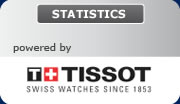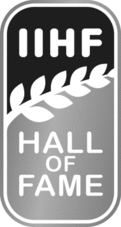
Bure, Helminen, Housley, Novy and Murray are class of 2012
ZURICH – Six-time Olympian and World record holder in national team games, Raimo Helminen, will be inducted to the IIHF Hall of Fame before his home audience in Helsinki next May. The Finn will be joined by players Pavel Bure (RUS), Phil Housley (USA), Milan Novy (CZE), and Andy Murray (CAN) in Builder’s category.
The IIHF Hall of Fame Induction Ceremony will be held on May 20, 2012 in Helsinki, Finland, on the final day of the 76th IIHF Ice Hockey World Championship. The inductees will be joined by Kent Angus (Canada), who will receive the Paul Loicq Award for outstanding contributions to the IIHF and international hockey.
The award is named after Paul Loicq, the Belgian who was the IIHF’s President for 25 years (1922-1947), inducted to the Hall of Fame in Toronto in 1961.
Scroll down for biographies of the five new members of the IIHF Hall of Fame and the Paul Loicq Award winner. The new honoured members of the IIHF Hall of Fame will be enshrined in the International (IIHF) Zone of the Hockey Hall of Fame in Toronto.
Click here for a complete list of all honoured members since the IIHF Hall of Fame was introduced in 1997. It now boasts 183 greats from 22 countries.
The members to the IIHF Hall of Fame and the Paul Loicq Award recipient are selected by the IIHF Historical Committee, Chairman: Tony Rossi, Members: Art Berglund, Jan-Ake Edvinsson, Jan Filc, Vsevolod Kukushkin, Kimmo Leinonen, Phil Pritchard, Secretary: Szymon Szemberg.
| |
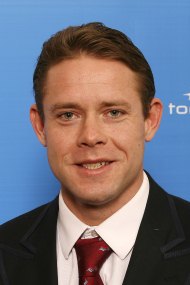
Pavel Bure (RUS)
Born: March 31, 1971 in Moscow, Soviet Union (Russia)
They called him the “Russian Rocket” and for good reason. Despite a career cut short because of injury, Pavel Bure was among the most electrifying players of his generation, one of the first players to star on both the international stage and in the NHL.
He burst onto the world scene at the 1989 U20 Championship in Alaska, playing with two veterans of the event, Sergei Fyodorov and Alexander Mogilny, to create arguably the greatest line in U20 history. Bure played at the 1990 and 1991 U20 as well, winning two gold and then a silver. He also played at the 1990 and ’91 World Championship, winning gold and bronze.
These would be his last games internationally for seven years. Bure had been drafted by Vancouver in 1989, and by 1991 he was able to join the Canucks and realize a dream of playing in the NHL. Just 20 years old, he was a star from almost his first shift, bringing a speed to the game that verged on daring.
By the end of his first season he had 34 goals and 60 points and beat out Nicklas Lidström for the Calder Trophy as the league’s top rookie. Bure then recorded two consecutive 60-goal, 100-point seasons and helped the Canucks advance to game seven of the Stanley Cup Finals in 1994.
En route he scored one of the biggest goals in franchise history, on a sensational breakaway in game seven of overtime against Calgary. He later had a 51-goal season with Vancouver before being traded to Florida. While with the Panthers, Bure won the new Rocket Richard Trophy twice (for leading the regular season in goals), scoring 58 goals in 1999-2000 and 59 goals the next year.
It wasn’t until the NHL allowed full participation in the Nagano Olympics that Bure played for his new country, Russia. Not only did he help take the Russians to the gold-medal game, he also produced one of the most dazzling individual performances of the modern Olympics, scoring five goals in a game against Finland on February 20, 1998. The team went on to lose 1-0 to the Czechs, though, and it had to settle for a silver medal. He won a bronze in 2002 in Salt Lake, his last international appearance.
Bure, however, suffered a series of evermore serious knee injuries, and was forced to retire in 2005. On that same day he was named Russia’s general manager for the 2006 Olympics in Turin. He becomes the 31st Russian named to the IIHF’s Hall of Fame.
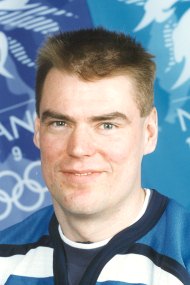
Raimo Helminen (FIN)
Born: March 11, 1964 in Tampere, Finland
The simple way to describe Helminen’s monumental contributions to the game both to his country and international hockey: By the time he played his final game for Finland in 2008, he had been part of all Olympic and World Championship medal team in Finland’s history except for the first-ever medal in 1992.
Still not enough? Consider then that Helminen played in more Olympics than any other hockey player – six – and represented his country at the senior level more times than anyone in the game’s history – 331. He may be the 15th Finn to be inducted into the IIHF Hall of Fame, but probably none before him from his country has done as much for the game.
Helminen first made a name for himself at the 1984 U20 Worlds when he set a scoring record with eleven goals and 22 points, leading Finland to a silver medal. So impressive was the 19-year-old that he was named to the country’s Olympic team the next month. His excellent season with both Ilves Tampere and the national team shot his NHL value sky high, and the New York Rangers drafted him 35th overall in the summer of 1984.
After one more season in Finland, he decided to try the NHL, but after playing for three teams in as many years he decided to move back to Europe, establishing himself as a star in Sweden’s Elitserien and becoming the first non-Swede to win the scoring title with Malmö (in 1992-93). He also led the team to two league championships.
During this time Helminen also played at the 1988 Olympics, a watershed moment in Finnish hockey history. The team won a silver medal, its first ever medal in hockey, and Helminen was a huge part of the team’s success.
He was not the biggest player or the strongest or the fastest, and he didn’t have a laser shot that made him famous. Instead, the centreman did everything incredibly well. Good on faceoffs and a coach’s delight for his skilled play at both ends of the ice, he was invaluable in the last minutes of key games and was a leader on ice and off.
Helminen moved home in 1996 and played the last 12 years of his pro career with Ilves. He captained the team the last nine years before retiring in 2008 at age 44, but it was in a Suomi sweater that he thrived. He was a key player in the team’s magical run at the 1995 World Championship in Stockholm, when Finland won gold for the first time in its history after beating rivals Sweden, 4-1, in the deciding game. Helminen had scored the winning goal against the Czechs in the semi-finals.
In all, he won that historic gold, four silvers, and a bronze in ten World Championships, and a silver and two bronze medals at the Olympics. When he played in 2002 at Salt Lake, his sixth Games, he established a record that might decades from now be equaled, but will surely never be bettered.
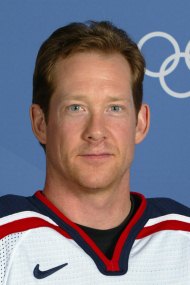
Phil Housley (USA)
Born: March 9, 1964 in St. Paul, Minnesota, United States
Few American players in the long and great history of hockey in the U.S. can boast a résumé with both significant NHL success and international participation. Phil Housley can, largely because he started his career at a young age and played for some two decades, representing his nine NHL teams and his country with a pride and skill that few could match.
Housley was one of the first Americans to be drafted straight out of high school. Buffalo selected him sixth overall in 1982 while the 18-year-old was still at South St. Paul High School in his hometown, and he made the Sabres at his rookie training camp that fall. He had made his Team USA debut earlier in the year at the U20, where the team finished sixth.
He was what one might call a second generation rushing defenceman, having grown up watching Bobby Orr, Brad Park, and Denis Potvin create so much offence while playing defence.
Cut from the same cloth, Housley was a superior skater and pinpoint passer who also had a great shot. These attributes made for a superstar blueliner, and in each of his first eleven seasons he had at least 60 points, peaking in 1992-93, with Winnipeg, when he had 97 points. During his career he played at the NHL’s All-Star Game seven times, a clear indication that he was among the very best of the best.
Housley always answered the call to play for his country. He took part at the IIHF World Championships on six occasions, scoring nine goals and 15 assists in 46 games. As well, he played for Team USA at the 1984 and 1987 Canada Cup tournaments and its successor, the 1996 World Cup, where the gold was USA Hockey's biggest triumph since the 1980 Miracle on Ice.
Although his final international appearance came at the 2003 World Championship in Finland, his last great blaze of glory came a year previous when he helped his country to a silver medal at the 2002 Olympics at Salt Lake. Housley, in fact, scored what proved to be the winning goal for the U.S. in a spectacularly exciting 3-2 win over Russia in the semi-finals before the team fell to Canada, 5-2, in the gold medal game.
At the age of 38, Housley led all U.S. defensemen in Salt Lake City with five points in six games. Only three U.S. forwards on this spectacular 2002 Olympic team had more points than Phil Housley.
Housley becomes the 20th American to join the IIHF Hall of Fame.

Milan Novy (CZE)
Born: September 23, 1951 in Kladno, Czechoslovakia (Czech Republic)
On skill alone, few could keep up with Milan Novy. He was a star in the Czechoslovak league, played a year in the NHL, and shone brightest on the international stage, winning a medal eight of nine times he played at the Olympics or World Championships.
From his first international tournament in 1975 to his last (1982), Novy failed to win a medal only once, the 1980 Olympics. But at the Lake Placid games, Novy led all scorers with 15 points in just six games.
Novy still ranks as the best scorer in the Czech and Czechoslovak hockey history. In 214 national team games, he ranked up an impressive total of 122 goals. He ended his career with 594 goals in Czechoslovak league play, still the all-time leader today.
Novy was one of international hockey's greatest stars between 1975 and 1980. He led Czechoslovakia to two IIHF World Championship gold medals in 1976 and 1977, scoring 15 points (9+6) in the 1976 event and 16 points (7+9) a year later. He was named to the Worlds' All Star Team in 1976.
At the 1977 Championship, he had a goal and an assist in a 4-3 win over the Soviet Union, the decisive game that led the Czechoslovaks to their first back-to-back World Championship titles in 27 years.
Novy became a truly international star on both sides of the Atlantic at the 1976 Canada Cup. In a game at the Montreal Forum, on September 9, his goal was the only one of the night in an historic 1-0 win for Czechoslovakia over Canada. It was the first time a best possible Canadian national team lost at home to an opponent other than the Soviet Union.
He was named the team’s best player and to the tournament All-Star Team in hockey's first ever open event when all top nations could enter their best players.
Novy used this great performance as a springboard to his best season in the Czechoslovak league, with Kladno, recording 59 goals in just 44 games and earning player of the year honours.
Novy grew up in the Kladno organisation, playing in the junior program until he was 17, in 1968, when he made the senior team. He played there for four years before joining Dukla Jihlava, leading the league in scoring his first season.
Novy played with Kladno until 1982. That summer he was drafted by the Washington Capitals and was allowed to join the team that autumn. He had a goal and two assists in his first NHL game and finished with an impressive 18 goals and 48 points on a very weak team. Novy returned to Europe after one season. After playing briefly in Switzerland and Austria, he returned to Kladno for three years, retiring in 1989 at age 37.
His return was symbolic. Just as he started his career at a time when other great players were in their prime (Vaclav Nedomansky, Vladimir Martinec), he ended his days in Kladno playing alongside 16-year-old Jaromir Jagr, a future great.
He led the Czechoslovak league in scoring three times thanks largely to his speed and skill, and excellent shot which he mastered by practicing off ice with a steel puck.
Novy is the 22nd person from the Czech Republic to be inducted into the IIHF Hall of Fame.
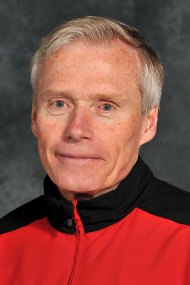
Andy Murray (CAN)
Born: March 3, 1951 in Gladstone, Manitoba, Canada
Gold. Gold. Gold. Not too many coaches can put that on their World Championship résumé. In fact, since the World Championship became an annual event in 1930, only one coach not from the Soviet Union has ever coached his team to three gold medals at the Worlds – Andy Murray.
But while Viktor Tikhonov, Boris Kulagin, Arkadi Chernyshev, and Anatoli Tarasov combined to win more than Murray, they did so with teams that were pretty similar from year to year. Not so Murray. As coach of Team Canada, he had three completely different rosters when he took the country to gold in 1997, 2003, and 2007.
In his international coaching appearances, he was a master of keeping his game plan simple, and his vast knowledge of the European game, the larger ice, the different refereeing, the adjusting to foreign cultures, were all vital in bringing the team together and creating a winning atmosphere.
Not since another IIHF Hall of Famer, the great Dave King, did Team Canada have a coach who understood the international game so well as Andy Murray.
A player who was never going to be good enough to make the NHL, he turned to coaching early while in Brandon, Manitoba, eventually coaching Brandon University. From there Murray ventured to Switzerland, his first of several journeys back and forth across the Atlantic.
Murray was an assistant for a year in the AHL and then moved up to the same position with three NHL teams over a six-year period, but in 1994 he returned to Europe, first back in Switzerland and then in Germany. It was during this five-year stretch that he got his first chance to coach Team Canada, at the 1997 Worlds in Finland. His roster included young players such as Jarome Iginla, Chris Pronger, and Anson Carter, but Murray got the team to play as a group, and it was as a group it succeeded.
Canada won the best-of-three finals with a 2-1 win over Sweden in the decisive game, giving the country its second gold in four years after a 33-year drought. It was three of the most intense World Championship games ever played.
Murray coached Canada again the next year to a disappointing sixth place finish, and in 1999 he returned to the NHL to coach the Los Angeles Kings for what would prove to be a six-year stint. In 2003, though, the Kings were out of the playoff race early and he was again invited to coach Canada at the Worlds.
This time, his quickly-crafted roster included a new generation of young stars, notably Eric Brewer, Dany Heatley, and Ryan Smyth. But two players who were with Murray in 1997 were key to gold in 2003 – goalie Sean Burke and forward Anson Carter. The gold medal game, against Sweden again, went to overtime, which was played four-on-four for the first time. Carter scored the winner on a wraparound, a goal that took ten tense minutes of video review to confirm.
In 2007, Murray was again available for Canada. Again he had a new roster to work with, but it was probably his most talented as well – Jonathan Toews, Rick Nash, Eric and Jordan Staal, Dion Phaneuf. Canada blazed through the tournament, winning all nine games and outscoring the opposition 41-21. Murray had won his hat trick of gold medals – and a place in IIHF history. He is the ninth Canadian Builder and 23rd Canadian overall to enter the IIHF Hall of Fame.
(for outstanding contributions to international hockey)

Kent Angus (CAN)
Born: July 31, 1952 in Toronto, Ontario, Canada
Kent Angus is credited for the IIHF being the major international sports federation with arguably the best organised and unified jersey and apparel program. Working for long-time IIHF partner Nike, Angus has been in charge of providing jerseys and off-ice apparel to all top division teams of the IIHF’s World Championship program and the Olympics since 1995, including 49 IIHF World Championship events and four Olympic Winter Games. His enthusiasm and personal ambition have made the IIHF jersey program widely admired in all international team sports, by fans, partners, broadcasters and suppliers alike.
For almost 15 years, Angus has worked closely with both the IIHF and the member national associations, serving in a professional manner whilst delivering the best possible product in terms of quality, design and appearance.
Kent Angus is notably often the first to arrive at a championship site and the last to leave. He has built up an organisation whereby jerseys are personalised with numbers and name bars in the tournament arenas, accordingly directing a program which very often works under immense pressure to fulfill the expectations of the IIHF, the teams and the players.
During the IIHF’s centennial year in 2008, Kent Angus was responsible for producing a collection of retro jerseys for the elite division teams, outfits which became immensely popular among fans and very sought-after collector items.
|














